ten good things returns (september and october, accordingly)
sorry it's been so long since i posted one of these. i've had most of this written down for nearly a month...
10. this is senator joe biden of delaware:

if the democrats take control of congress today, senator biden is positioned to become the head of the senate foreign relations committee in the u.s. government.
on may 1st of this year, biden co-authored (with leslie gelb) an op-ed piece in the new york times outlining a potential exit strategy in iraq. the plan relies heavily on tactics used by NATO in bosnia during the clinton years. there are a lot of arguments against it; daily kos slammed it, for example. now, i'm no expert on foreign policy, and i'm just beginning to get my feet wet in my understanding of the ethnic conflicts in the region, but i really like the idea of a guy who's willing to get a dialogue going in this position in our government. biden isn't belaboring things we already know about the dishonesty of the administration. nor is he necessarily entertaining the fantasy of a quick escape from the region... and as far as i'm concerned, the bottom line in iraq at this point is preventing civilian deaths. i have a cautious amount of confidence that biden might provide a needed jolt in the pressure on the administration to think up a quasi-ethical way out (according to his own plan, or whoever's)... if we can even use the word "ethical" at this point, which we can't.
so go vote these right wing fucks out of office. and if you're still entertaining sleepy, fatalistic fantasies about how both sides are equally corrupt, try to remember that five years ago we didn't have a government that *LITERALLY ADVOCATES TORTURE*... when you get back from the polls, you can read the remaining nine, ok?
9. i'm not a big fan of myths. or, to be more specific, i kind of resent the use-value of myths: their status as something grand and allegorical, something purportedly large enough to encompass the "human" experience, or what have you. i prefer localized, specific narratives aesthetically; and things that challenge or extend my own comprehension philosophically.

soulymane cisse's magnificent 1987 film yeelen has the structure of a myth (albeit one of pre-colonial mali, instead of the greco roman sort), but (to my western eyes) remains mostly beyond the scope of my own interpretation(s). i'm not certain i've ever seen an example of "third world cinema" more indifferent to the sensibilities of a western theatre-goer (not that i'm particularly well schooled in this niche-- but i'm workin' on it)-- very little context is given, but the story maintains a consistent, somewhat foreboding reverence that is hard to turn away from, nonetheless. put simply, the experience of not knowing what the hell was going on was not only enjoyable, but seemed somehow necessary. had more context been given, the integrity of what i must assume to be a sincerely indigenous (let me know if i'm getting this wrong here) narrative would have cast a different spell. as it is, it's a remarkably well-paced, intensely ritualistic story that maintains an eerie hum of the supernatural. there are a few western films that i could compare it to emotionally (herzog's heart of glass, kubrick's 2001: a space odyssey), but, as a whole, it's one of the most unique film experiences i've ever had.
8. i was walking down my street the other night at about 8:30pm when i saw something peculiar. a bit of debris in the middle of the street began hopping. being that there was no wind, i was perplexed and walked up to it. and then i discovered that it was not debris at all, but was in fact...

... a toad! i stood there marvelling at it for a moment. i totally freak out whenever i see cool little reptiles and amphibians. one of the things i miss most dearly about living in san diego for three years was walking to school and watching lizards scurry along the dirt path i'd take to get there. anyway, some little girl on the sidewalk asked me what i was doing and i exclaimed with great delight "there's a toad in the street!"... which her rather surly mother took to be an invite from an adult to walk out into traffic... so i threw her an apologetic glance, and felt like an idiot (which is exactly what i am). whatever. the little girl wasn't feelin' the whole deal as much as me anyway. her loss.
7. i attended a nice wedding a few weeks ago in new hampshire, and on the drive back, me and my friend laura listened to a lot of new order. when i got home, i pulled out my old copy of power, corruption and lies, which has a great album cover:
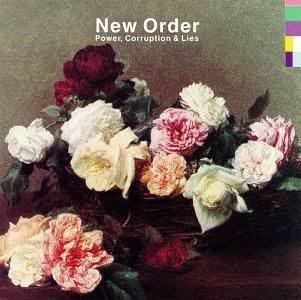
anyone who knows me in real life can attest to the fact that i'm no great fan of the eighties. in fact, were it not for the influence of my one-time-roommate bearbait, i'd probably never have given new order a chance. but i did-- about six years back-- and i'm glad i did. i love the way new order songs seem so carefully composed, but are never dynamic-- there's something consistent and even about the way a new order song feels. this consistency in tone makes them one of the most contemplative pop groups in my record collection. i find their songs happy and sad at the same time, which i find a lot easier to swallow than the doom and gloom of their predecessor, joy division. most things that affect me most are happy and sad at the same time, honestly.
anyway, here's an mp3 of the new order song that sold me on the band. it sounds more like kraftwerk than "classic" new order, but whatever:
"your silent face," new order, mp3
6. over the past two months, i've read three books by ryszard kapuscinski, and i can't get enough of the guy. kapuscinski is noteworthy for being the first polish foreign correspondent to enter sub-saharan africa in the country's history. this status triggered a surprising, life-long dedication to seeking out many of the most volatile post-colonial situations of recent history (in africa, as well as other developing nations across the globe). his journalistic adventures have prompted most of his available texts to boast-- in the "about the author" blurp-- of his bearing witness to 27 coup d'etats, and his survival of four seperate death sentences!!!.
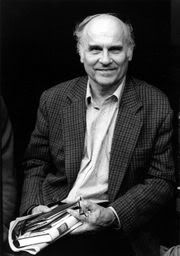
surely, there is a sense of bravado to such obsessive undertakings, but kapuscinski's writing style is remarkably level-headed and unsensational. there's a detachment to it-- but not one borne out of disinterest... he is humble enough, as a spectator, to resist embellishing the events he observes. and as a writer, he is concise and articulate enough to make disparate and contradictory political situations come together in the form of an engaging story.
first i read the shadow of the sun, a memoir dedicated to his complicated, lifelong affection for africa. i followed that with the emperor, a strange little book composed almost entirely of direct accounts from the official court of ethiopian emperor haile sellasie, following the coup that removed him from power in the mid-seventies. finally, i read another day of life, in which kapuscinski finds his life in imminent danger, following the collapse of portuguese imperial power in angola. i highly recommend all three. and they're totally read-able, as well...
5.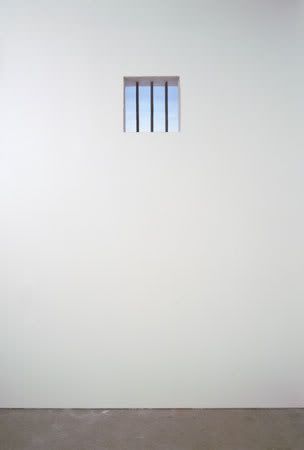
robert gober's prison window, which was included in the museum of modern art's well-curated out of time exhibition (which is still up in NYC), was a pleasant reminder of why his work is so imprtant to me. you can't tell from that image, but this piece consists of a tiny fabricated window about a storey up on the gallery wall. gober is a master at making everyday objects both personal and enigmatic. with this piece, he transforms a peculiar little corner of a room into a fantasy space of jean-genet-esque erotic longing. it was probably my favorite thing in the exhibition.
4. has anyone else been following the debate between steely dan and wes anderson? i have, and i think it's pretty damn funny. i'll try to recap for ya...
* actor and part-time-wes-anderson collaborator owen wilson makes a movie titled you, me and dupree. seventies prog-jazz-band steely dan suspects that the film takes its name and premise from their song "cousin dupree", and decide to check it out.
* steely dan decides that owen wilson's movie sucks. and they still think the premise for it came from their song. they then write an open letter to owen's younger brother luke wilson (because they like him better as an actor) demanding a public apology from owen for his suckiness.
* later-- and for no apparent reason-- steely dan decides to follow up the letter to luke wilson with an additional one to film director wes anderson. the second letter compliments anderson on his talent, but sites a decline in the quality of his work over the years, and cautions him to resist "the same sort of willing harlotry that befalls so many bright young men who take their aspirations to Hollywood and their talent for granted."
* now, i'm probably in the vast minority here, because i kinda like wes anderson and steely dan. and i disagree with steely dan when they argue that bottle rocket is anderson's best. i think it's his worst, and that rushmore is by far his best. but even if you object to the details, or find this whole business obnoxious, or pretentious-- you gotta hand it to these guys for writing a really sharp critique of the dude. if you're familiar with anderson's films, you should read the letter. it's hilarious, and wickedly spot-on at times, and 100% admirably weird.
3. my friends jee and jena started a band in NYC called taigaa! (which sounds suspiciously like the name of a certain large feline when shouted out loud), and i had the good fortune to see them in new york about a month ago. here's the most awesome picture i could find of them rocking out on their website:
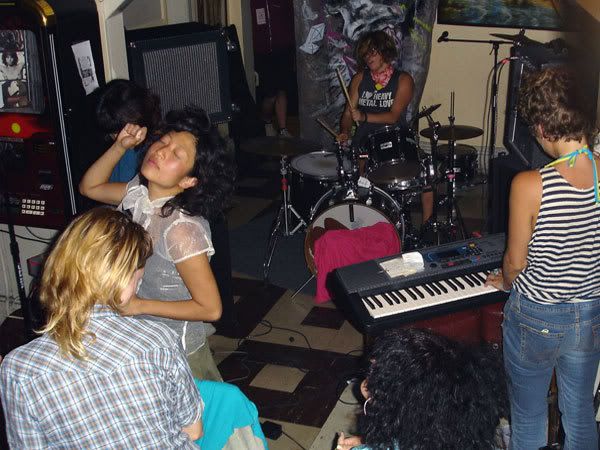
their music reminds me a little of the raincoats, only more rough and raw, or something. it's really fun, weird music, but it's never terribly inaccessible. there's mp3's on their website. you should listen to them. my recent trip to new york was a pleasant reminder that a lot of the talented people i know are putting shit together in interesting ways. it's inspiring.
(i hate the word "inspiring". but i can't think of a better one.)
2. in 1989, hungarian novelist laszlo krasznahorkai wrote a book titled the melancholy of resistance. in 2000, he collaborated with directors bela tarr and agnes hranitsky on a film adaptation of the central chapter of the book, titled werckmeister harmonies.
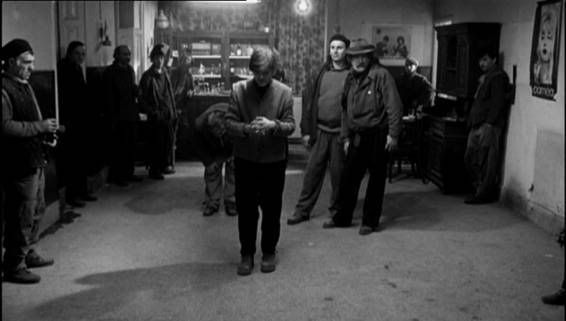
i saw the film about a year ago, and finished the book last month. together, they form one of the most miraculous collaborative projects i've ever encountered-- feeding off each other in the most expansive way possible. i won't say much about the plot, because its premise is intruiging enough on its own to spark your curiosity... it concerns a melancholic rural village (presumably in hungary, though i don't think either specifies this), in which a circus comes to town boasting the world's largest stuffed whale. and, for reasons that need to be experienced rather than explained, the arrival of this beast makes the town go crazy-- resulting in an apocalyptic eruption of totalitarian mob mentality.
taken together, the projects form about as complete a picture of human fatalism as you are bound to find anywhere. krasznahorkai's novel brought me deep inside the reactionary urban fear of each of its characters, whereas tarr/hranitsky's film made the atmosphere palpable. at the heart of the story is valushka-- an eccentric young man with a near-pantheistic need to make his peculiar breed of spiritual mysticism physical. at the beginning of the film (see above), we see him orchestrate a series of drunken barflys into his own, physical interpretation of a solar eclipse. with his ever-present sense of wonder, he is almost the polar opposite of everything else in the story. his enthusiasm is palpable-- and heartbreaking, in contrast to the malaise of his surrounding world. the book/film draws you in to his sacred little universe; you can feel the urgency with which he must make abstractions into tangilbe actions. valuska doesn't stroll through the town as much as orbit it, and the story weighs its "macro" and "micro" approaches accordingly.
it's a tragic story, in the end. the reactionary, and often inexplicable panic that wells up within the town grows unstoppable. as fatalism soon completely overwhelms each of its characters, the tone is not only spiritual, but political. as wonder gave way to contempt, i felt as though the very skeleton of a fascist body were coming together within the narrative. the story is devastating because it's never hateful. there's something warm about it, right up to the bitter end. there's something deeply at stake within each of its actions, and it really got me in the gut as i watched it all slip away.
1. approprately enough, the cover image on my copy of the melancholy of resistance is a detail of james ensor's 1889 painting christ's entry into brussels, which is about as good a candidate for my favorite painting of all time as i can think of, off-hand:
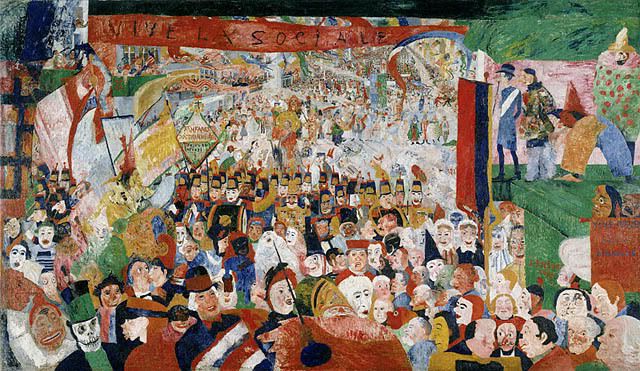
10. this is senator joe biden of delaware:

if the democrats take control of congress today, senator biden is positioned to become the head of the senate foreign relations committee in the u.s. government.
on may 1st of this year, biden co-authored (with leslie gelb) an op-ed piece in the new york times outlining a potential exit strategy in iraq. the plan relies heavily on tactics used by NATO in bosnia during the clinton years. there are a lot of arguments against it; daily kos slammed it, for example. now, i'm no expert on foreign policy, and i'm just beginning to get my feet wet in my understanding of the ethnic conflicts in the region, but i really like the idea of a guy who's willing to get a dialogue going in this position in our government. biden isn't belaboring things we already know about the dishonesty of the administration. nor is he necessarily entertaining the fantasy of a quick escape from the region... and as far as i'm concerned, the bottom line in iraq at this point is preventing civilian deaths. i have a cautious amount of confidence that biden might provide a needed jolt in the pressure on the administration to think up a quasi-ethical way out (according to his own plan, or whoever's)... if we can even use the word "ethical" at this point, which we can't.
so go vote these right wing fucks out of office. and if you're still entertaining sleepy, fatalistic fantasies about how both sides are equally corrupt, try to remember that five years ago we didn't have a government that *LITERALLY ADVOCATES TORTURE*... when you get back from the polls, you can read the remaining nine, ok?
9. i'm not a big fan of myths. or, to be more specific, i kind of resent the use-value of myths: their status as something grand and allegorical, something purportedly large enough to encompass the "human" experience, or what have you. i prefer localized, specific narratives aesthetically; and things that challenge or extend my own comprehension philosophically.

soulymane cisse's magnificent 1987 film yeelen has the structure of a myth (albeit one of pre-colonial mali, instead of the greco roman sort), but (to my western eyes) remains mostly beyond the scope of my own interpretation(s). i'm not certain i've ever seen an example of "third world cinema" more indifferent to the sensibilities of a western theatre-goer (not that i'm particularly well schooled in this niche-- but i'm workin' on it)-- very little context is given, but the story maintains a consistent, somewhat foreboding reverence that is hard to turn away from, nonetheless. put simply, the experience of not knowing what the hell was going on was not only enjoyable, but seemed somehow necessary. had more context been given, the integrity of what i must assume to be a sincerely indigenous (let me know if i'm getting this wrong here) narrative would have cast a different spell. as it is, it's a remarkably well-paced, intensely ritualistic story that maintains an eerie hum of the supernatural. there are a few western films that i could compare it to emotionally (herzog's heart of glass, kubrick's 2001: a space odyssey), but, as a whole, it's one of the most unique film experiences i've ever had.
8. i was walking down my street the other night at about 8:30pm when i saw something peculiar. a bit of debris in the middle of the street began hopping. being that there was no wind, i was perplexed and walked up to it. and then i discovered that it was not debris at all, but was in fact...

... a toad! i stood there marvelling at it for a moment. i totally freak out whenever i see cool little reptiles and amphibians. one of the things i miss most dearly about living in san diego for three years was walking to school and watching lizards scurry along the dirt path i'd take to get there. anyway, some little girl on the sidewalk asked me what i was doing and i exclaimed with great delight "there's a toad in the street!"... which her rather surly mother took to be an invite from an adult to walk out into traffic... so i threw her an apologetic glance, and felt like an idiot (which is exactly what i am). whatever. the little girl wasn't feelin' the whole deal as much as me anyway. her loss.
7. i attended a nice wedding a few weeks ago in new hampshire, and on the drive back, me and my friend laura listened to a lot of new order. when i got home, i pulled out my old copy of power, corruption and lies, which has a great album cover:

anyone who knows me in real life can attest to the fact that i'm no great fan of the eighties. in fact, were it not for the influence of my one-time-roommate bearbait, i'd probably never have given new order a chance. but i did-- about six years back-- and i'm glad i did. i love the way new order songs seem so carefully composed, but are never dynamic-- there's something consistent and even about the way a new order song feels. this consistency in tone makes them one of the most contemplative pop groups in my record collection. i find their songs happy and sad at the same time, which i find a lot easier to swallow than the doom and gloom of their predecessor, joy division. most things that affect me most are happy and sad at the same time, honestly.
anyway, here's an mp3 of the new order song that sold me on the band. it sounds more like kraftwerk than "classic" new order, but whatever:
"your silent face," new order, mp3
6. over the past two months, i've read three books by ryszard kapuscinski, and i can't get enough of the guy. kapuscinski is noteworthy for being the first polish foreign correspondent to enter sub-saharan africa in the country's history. this status triggered a surprising, life-long dedication to seeking out many of the most volatile post-colonial situations of recent history (in africa, as well as other developing nations across the globe). his journalistic adventures have prompted most of his available texts to boast-- in the "about the author" blurp-- of his bearing witness to 27 coup d'etats, and his survival of four seperate death sentences!!!.

surely, there is a sense of bravado to such obsessive undertakings, but kapuscinski's writing style is remarkably level-headed and unsensational. there's a detachment to it-- but not one borne out of disinterest... he is humble enough, as a spectator, to resist embellishing the events he observes. and as a writer, he is concise and articulate enough to make disparate and contradictory political situations come together in the form of an engaging story.
first i read the shadow of the sun, a memoir dedicated to his complicated, lifelong affection for africa. i followed that with the emperor, a strange little book composed almost entirely of direct accounts from the official court of ethiopian emperor haile sellasie, following the coup that removed him from power in the mid-seventies. finally, i read another day of life, in which kapuscinski finds his life in imminent danger, following the collapse of portuguese imperial power in angola. i highly recommend all three. and they're totally read-able, as well...
5.

robert gober's prison window, which was included in the museum of modern art's well-curated out of time exhibition (which is still up in NYC), was a pleasant reminder of why his work is so imprtant to me. you can't tell from that image, but this piece consists of a tiny fabricated window about a storey up on the gallery wall. gober is a master at making everyday objects both personal and enigmatic. with this piece, he transforms a peculiar little corner of a room into a fantasy space of jean-genet-esque erotic longing. it was probably my favorite thing in the exhibition.
4. has anyone else been following the debate between steely dan and wes anderson? i have, and i think it's pretty damn funny. i'll try to recap for ya...
* actor and part-time-wes-anderson collaborator owen wilson makes a movie titled you, me and dupree. seventies prog-jazz-band steely dan suspects that the film takes its name and premise from their song "cousin dupree", and decide to check it out.
* steely dan decides that owen wilson's movie sucks. and they still think the premise for it came from their song. they then write an open letter to owen's younger brother luke wilson (because they like him better as an actor) demanding a public apology from owen for his suckiness.
* later-- and for no apparent reason-- steely dan decides to follow up the letter to luke wilson with an additional one to film director wes anderson. the second letter compliments anderson on his talent, but sites a decline in the quality of his work over the years, and cautions him to resist "the same sort of willing harlotry that befalls so many bright young men who take their aspirations to Hollywood and their talent for granted."
* now, i'm probably in the vast minority here, because i kinda like wes anderson and steely dan. and i disagree with steely dan when they argue that bottle rocket is anderson's best. i think it's his worst, and that rushmore is by far his best. but even if you object to the details, or find this whole business obnoxious, or pretentious-- you gotta hand it to these guys for writing a really sharp critique of the dude. if you're familiar with anderson's films, you should read the letter. it's hilarious, and wickedly spot-on at times, and 100% admirably weird.
3. my friends jee and jena started a band in NYC called taigaa! (which sounds suspiciously like the name of a certain large feline when shouted out loud), and i had the good fortune to see them in new york about a month ago. here's the most awesome picture i could find of them rocking out on their website:

their music reminds me a little of the raincoats, only more rough and raw, or something. it's really fun, weird music, but it's never terribly inaccessible. there's mp3's on their website. you should listen to them. my recent trip to new york was a pleasant reminder that a lot of the talented people i know are putting shit together in interesting ways. it's inspiring.
(i hate the word "inspiring". but i can't think of a better one.)
2. in 1989, hungarian novelist laszlo krasznahorkai wrote a book titled the melancholy of resistance. in 2000, he collaborated with directors bela tarr and agnes hranitsky on a film adaptation of the central chapter of the book, titled werckmeister harmonies.

i saw the film about a year ago, and finished the book last month. together, they form one of the most miraculous collaborative projects i've ever encountered-- feeding off each other in the most expansive way possible. i won't say much about the plot, because its premise is intruiging enough on its own to spark your curiosity... it concerns a melancholic rural village (presumably in hungary, though i don't think either specifies this), in which a circus comes to town boasting the world's largest stuffed whale. and, for reasons that need to be experienced rather than explained, the arrival of this beast makes the town go crazy-- resulting in an apocalyptic eruption of totalitarian mob mentality.
taken together, the projects form about as complete a picture of human fatalism as you are bound to find anywhere. krasznahorkai's novel brought me deep inside the reactionary urban fear of each of its characters, whereas tarr/hranitsky's film made the atmosphere palpable. at the heart of the story is valushka-- an eccentric young man with a near-pantheistic need to make his peculiar breed of spiritual mysticism physical. at the beginning of the film (see above), we see him orchestrate a series of drunken barflys into his own, physical interpretation of a solar eclipse. with his ever-present sense of wonder, he is almost the polar opposite of everything else in the story. his enthusiasm is palpable-- and heartbreaking, in contrast to the malaise of his surrounding world. the book/film draws you in to his sacred little universe; you can feel the urgency with which he must make abstractions into tangilbe actions. valuska doesn't stroll through the town as much as orbit it, and the story weighs its "macro" and "micro" approaches accordingly.
it's a tragic story, in the end. the reactionary, and often inexplicable panic that wells up within the town grows unstoppable. as fatalism soon completely overwhelms each of its characters, the tone is not only spiritual, but political. as wonder gave way to contempt, i felt as though the very skeleton of a fascist body were coming together within the narrative. the story is devastating because it's never hateful. there's something warm about it, right up to the bitter end. there's something deeply at stake within each of its actions, and it really got me in the gut as i watched it all slip away.
1. approprately enough, the cover image on my copy of the melancholy of resistance is a detail of james ensor's 1889 painting christ's entry into brussels, which is about as good a candidate for my favorite painting of all time as i can think of, off-hand:
